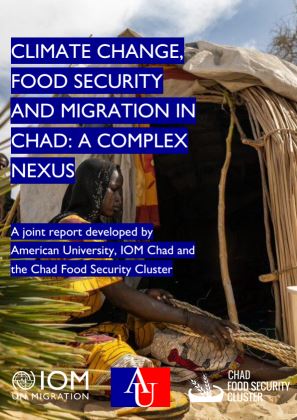-
Countries
-
Data and Analysis
-
Special Focus
-
Crisis Responses
Climate Change, Food Security and Migration in Chad: A Complex Nexus (2021)

Contact
DTM Chad, dtmtchad@iom.int
Language
English
Location
Chad
Snapshot Date
Jul 30 2021
Activity
- Other
Migration in and through Chad and the Sahel has occurred for a variety of reasons over many generations. Migration is a natural process of populations and often is driven by actions of development and social transformation. It also can be triggered in certain circumstances by food insecurity, livelihood instability, violence, and climate change. This paper will draw on existing sources and data analysis to explore the interaction and correlation between two important recent drivers—and disruptors—of migration patterns in Chad: climate change and food insecurity. Identifying and understanding the interactions between migration, climate change, and food insecurity is instrumental in the design of systemic interventions that aim to promote sustainable societies and livelihoods.
Working in conjunction with the International Organization for Migration (IOM) - Chad, the American University team has been charged with research and data analysis to support the following strategic goals:
- To characterize the impact of climate change on migration in Chad
- To improve understanding of current migration patterns related to food insecurity in Chad
In its overview of existing research on these topics, this paper will provide a context for the Team’s analysis of data from IOM’s surveys and focus group inputs from Chadian migrants. The report identifies key recommendations both to mitigate and facilitate adaptive migration through the lens of food security and a changing climate. These include establishing better integration policies for persons in protracted displacement, for whom there may be no return; a focus on learning from bottom-up climate adaptation methods; prioritizing resilience-building assistance targeted to the needs of the displaced rather than security assistance; and increasing the role of women in leadership. The report concludes with a short list of further research needs. A reframing of the vocabulary of migration and displacement in Chad may be in order, as this vocabulary affects data collection and subsequent responses of governmental and non-governmental organizations to affected populations.
